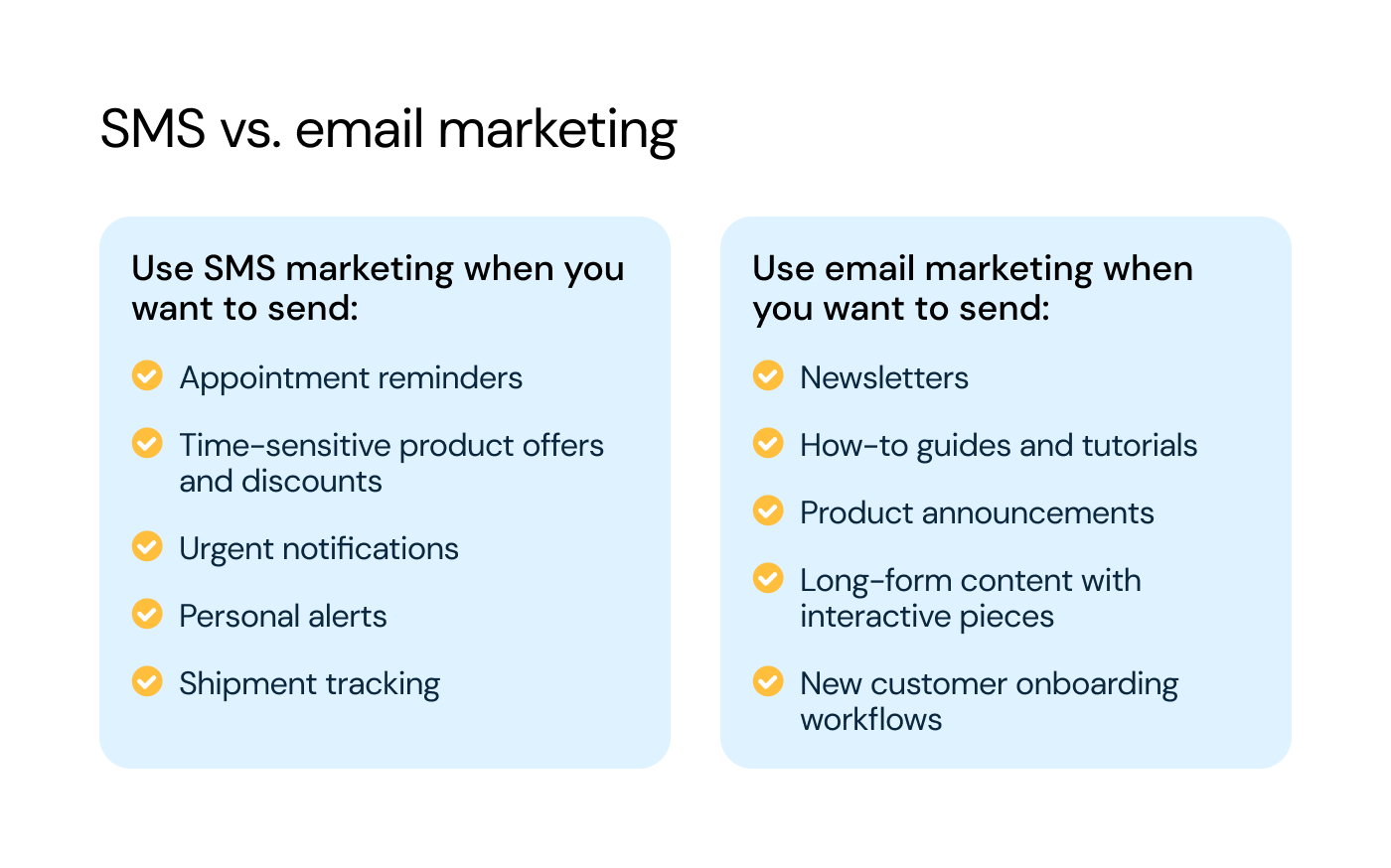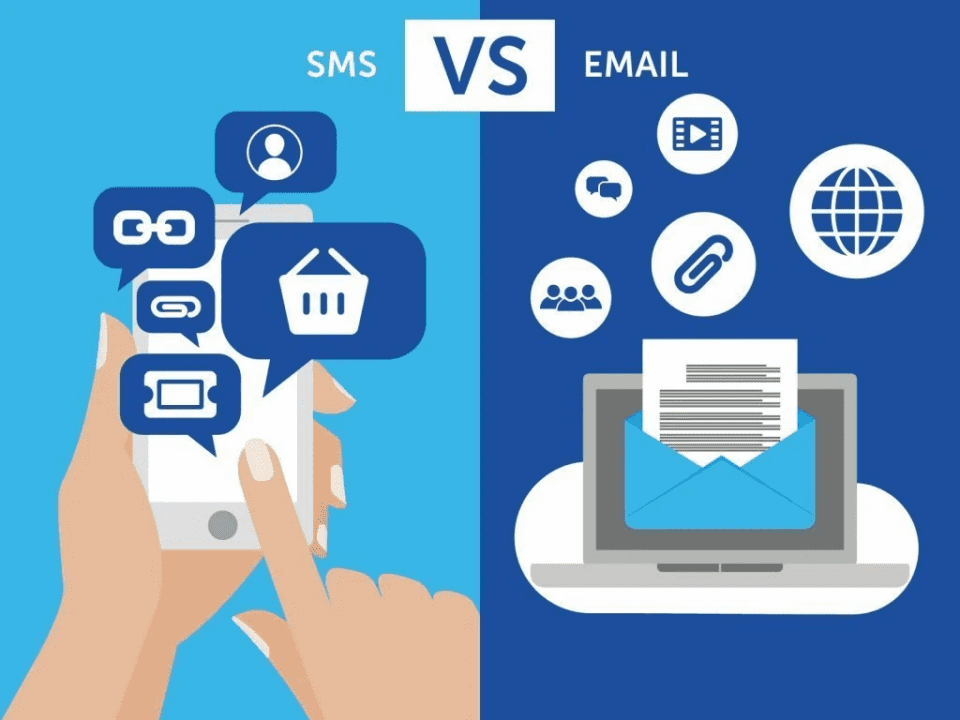When deciding on a marketing channel for your customers, determining the best method can be a challenge. Have you ever wondered whether Email Marketing or SMS Marketing is a better choice for your Brand?
To help you determine the best way to reach and engage your customers, let’s take a look at the pros and cons of SMS and Email Marketing.
1. What is the difference between Email Marketing and SMS Marketing?
Aside from the sending method, there are some important differences between the two channels.
Customers Sign-up to receive News
In both channels, when starting, we need to collect customers’ emails or phone numbers. Customers are often more willing to provide their emails than their phone numbers, because emails are less annoying to them, especially with the recent rise in text/call scams. Therefore, you can first consider using the email channel until you have the trust of your readers, then switch to SMS if really needed.
Expense
According to MarkKnow, email is a good choice if your business needs to optimize costs, but you should also determine which channel to use based on the quality of your lead file and collected data. If your email list is of higher quality, it is probably best to prioritize email and vice versa.
Content Style
One key difference between email marketing and SMS is how the content is presented.
The ideal SMS is 160 characters and straight to the point, otherwise the content can be split into multiple messages when sent to subscribers.
Emails, on the other hand, can be much longer and address different points. With emails, you need a compelling subject line to grab your reader’s attention. Design elements such as images, bold text, bullet points and colors, or prominent call-to-action buttons can help emphasize elements in the email.
Frequency
Regarding frequency, although both should not be sent too much in a day, email seems to be more advantageous because we can send more notifications or confirmation information, send promotions. SMS channel you should be careful with high frequency because it is easier for customers to block and with SMS channel, customers are usually only interested in some notifications from the network provider providing the SIM. Phone numbers and switchboards of unknown origin/name can make the recipient suspect fraud.
Timeliness
Since your customers are constantly checking their phones, SMS can be a smarter option for timely customer communication, such as shipping confirmations or two-hour flash sale announcements.
Emails can last for hours or days before they are read, making text messages more effective for infrequent customers who need to make a purchase within a short time frame (e.g. a 1-hour sale).
Customize and Personalize
Both Email and SMS are customizable and personalized. You can leverage them to make your message more effective. But keep in mind that the rules and policies for these two channels are different.
Message Delivery Success-rate
The sooner you can reach your customers, the sooner you can prompt them to take action.
SMS has an advantage over Email in terms of sending speed. With email, after being sent to the recipient’s email Server, your email must be censored before it appears in the customer’s inbox.
Both of these channels have different distribution methods, but if the reputation of the email or SMS sending address is low or unknown, filters will mostly move it to spam.
Measurement
Because email has been around much longer than SMS, email marketing metrics are more robust. Analytics tools can provide insights into your open rates, unsubscribe rates, clicks, and conversions. SMS metrics are less complete, but you can still access key metrics like open and click rates.
MarkKnow recommends sharing exclusive coupon codes (e.g. Email-123 or SMS-123) and trackable links when using both email and SMS channels to easily track total Sales generated through either channel.

2. Advantages of Email Marketing
Email Marketing has many advantages. With relatively low costs, Email brings quite good efficiency for your expenses (of course, it also depends on the quality of the email list).
Email also offers the ability to delight your recipients with more beautiful, eye-catching, or informative content.
Another benefit of Email Marketing is that customers are often very comfortable interacting with brands through their inbox.
You can send re-engagement messages to customers or ask them to re-subscribe (whereas text subscribers are hard to get back). Additionally, Email Marketing has a greater range of tools and tracking capabilities that make it easier to manage your campaigns and measure your results.
3. Disadvantages of Email Marketing
On the other hand, Email Marketing also has disadvantages. Customers’ email inboxes are often full of emails, not only us, but other parties also send emails to customers and this requires our content to really attract readers.
As the volume of email customers receive increases, mailbox providers are tightening their filtering algorithms and redirecting more marketing content to consumers’ spam/promotion folders. This reduces your ability to reach your customers.
To limit the impact on sender reputation, mailbox providers like Gmail remind users to unsubscribe from emails after 30 days of inactivity, which email senders can also proactively rely on automatically filtered segments on the Email Marketing system.
4. Advantages of SMS
SMS is a “younger” channel than email, SMS marketing has some advantages in that it is much less saturated than email, meaning your audience is more likely to actually read your messages. But as MarkKnow has seen, SMS messages received have also increased significantly over the past few years.
Although SMS marketing costs a bit more, the open rates are higher than email since SMS does not require internet access to see the message making it one of the most effective approaches to engage with customers.
Although SMS marketing has a character limit, this can be both an advantage and an advantage, because you can focus on the main message. As for email, if you are “greedy” and insert too much content, it can be rambling and ineffective.
5. Disadvantages of SMS marketing
SMS has its own set of disadvantages. First and foremost, SMS is subject to more regulations than email and must be strictly adhered to in order to avoid penalties.
And while SMS marketing can be much more user-friendly than email, you’re more likely to make your customers feel annoyed if you text too often or send unimportant messages.
Above are some advantages and disadvantages of both SMS marketing and Email Marketing channels. The question of whether to use SMS or Email Marketing depends on the data you collect, the cost and the desired approach. Hopefully, you will have the right choice for your business through the article.
Comment Policy: We truly value your comments and appreciate the time you take to share your thoughts and feedback with us.
Note: Comments that are identified as spam or purely promotional will be removed.
To enhance your commenting experience, consider creating a Gravatar account. By adding an avatar and using the same e-mail here, your comments will feature a unique and recognizable avatar, making it easier for other members to identify you.
Please use a valid e-mail address so you can receive notifications when your comments receive replies.
